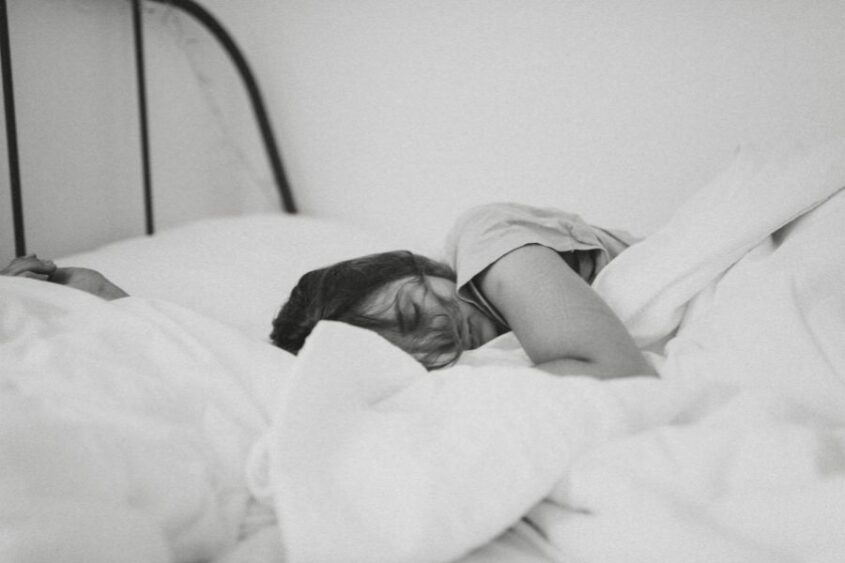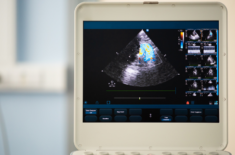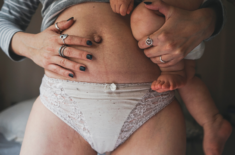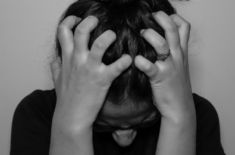What’s Postpartum Night Sweating?
Night sweats are defined as hot flashes, possibly severe, that can drench your clothes and bedsheets during the night. It happens during the postpartum period (from birth to around six weeks later).
You can also experience excessive sweating during the day, but it can be more uncomfortable during the night when you’re trying to catch up on your sleep.
Although not life-threatening, night sweats can cause sleep disturbance, embarrassment, irritability, and a reduction in your quality of life. (1)
With stress and sleep deprivation among the most common causes of postpartum depression, baby blues, rage, and anxiety, it’s important to find ways to feel better as soon as possible. (2)(3)
What causes postpartum night sweats, and can drinking water help reduce the symptoms? Read on to find out below.
How Common Is Postpartum Night Sweating?
As many as 29% of women can experience hot flashes and night sweats postpartum, while 35% might have it during pregnancy. (1)
Is It Normal To Experience Postpartum Night Sweats, Or Should I Be Concerned?
Yes. It’s normal and is rarely a cause for concern.
Signs & Symptoms Of Postpartum Night Sweats
The most common symptom is waking up drenched in sweat in the middle of the night. However, you can also experience the following:
- Discomfort and waking up a lot
- More frequent urination
- Strong body odor
- Irritability
- Tiredness
- Rapid heartbeat
Why Are You Sweating at Night? Causes Of Postpartum Night Sweats
Fluctuations In Pregnancy Hormones
Excessive night sweating may be caused by sudden hormonal changes that women experience right after childbirth. (1)
Your body needs high levels of estrogen and progesterone during pregnancy, but they’re no longer necessary in those quantities after childbirth. That’s why there’s a dramatic drop in hormone levels within just a few hours of delivery. (3)
These changes in your hormone levels can help your body get rid of the excess fluids and the so-called “water weight” your body accumulated during pregnancy.
That’s because you gain an estimated 2-3 lbs of increased fluids during this period (also among the reasons for postpartum swelling), according to the Mayo Clinic. (4)
Postpartum sweating can also be due to the side effects of hormone therapy (such as estrogen therapy for postpartum depression). (5)
Warm Environment
Sweating is our body’s natural response to heat, especially in your environment. So, if your bedroom is warm, you’re more likely to experience night sweats.
However, if you’re suddenly experiencing sweats even in temperatures you could normally tolerate in the past, it might be due to internal problems such as pregnancy hormones or an underlying medical condition.
Having too many pillows and blankets, especially if they’re made of warm materials like wool, can cause night sweats.
Food & Drinks That Can Cause Night Sweats
- Hot drinks
- Coffee
- Alcohol
- Spicy foods
Medical Conditions That Might Cause Sweating
Some medical conditions can also cause sweating: (5)
- Hormone disorders
- Hyperthyroidism – overactive thyroid (can accelerate your metabolism and cause rapid or irregular heartbeat and unintentional weight loss
- Postpartum thyroiditis – inflammation of the thyroid gland
- Diabetes – high blood sugar
- Hypoglycemia – low blood sugar
- Infections (see below)
- Chronic sweating condition
- Obstructive sleep apnea – breathing is momentarily cut off while sleeping because some muscles relax
- Cancer
Treatment of your underlying condition might help reduce your nighttime sweating.
Is It Due To An Infection?
Some bacterial infections can cause excessive sweating: (5)
- Tuberculosis – a bacterial infection that usually affects the lungs
- Endocarditis – inflammation of the heart valves
- Osteomyelitis – inflammation of the bones
Be sure to visit your OB-GYN or healthcare provider if you experience fever and other signs of infection, including rashes, vomiting, nausea, and chills.
Ask Help For Anxiety & Emotional Problems
Mood disorders and emotional problems, including anxiety and depression, can lead to postpartum symptoms such as excessive sweating. (5)
Ask for help if you experience these mood disorders and emotional problems because they can affect your capacity to care for your new baby.
Does Breastfeeding Make You Sweat?
Lactation keeps estrogen levels low, which can lead to postpartum sweating. (6)
Menopause
Night sweats and hot flashes are considered the first signs of menopause (the end of a woman’s menstrual cycle). They’re often due to hormonal fluctuations. (1)(5)
Side Effects Of Medications & Substances
Some medications (including antihypertensives to treat high blood pressure) and drugs of abuse (such as heroin or alcohol) can also cause night sweats. (7)
30 Ways To Deal With Postpartum Night Sweats: Treatment & Wellness Tips
- Drink plenty of water to stay hydrated
- Drinking cold water might be better than lukewarm or hot
- Try breathing techniques and hypnosis (8)
- Eat well and practice good nutrition with whole foods
- Exercise or try Pilates and yoga during the day (only after getting your doctor’s approval at 6+ weeks postpartum)
- Avoid exercising close to your bedtime
- Get a back massage
- Foot reflexology
- Use natural fabrics for your bedsheets
- Sleep on a towel or cotton bedding to absorb some of the sweat
- Use lightweight or moisture-absorbing bed sheets
- Sleep in your underwear
- Wear lightweight, loose clothes – cotton and natural fibers are preferable
- Change your pajamas
- Drink less coffee, especially at night
- Avoid alcohol
- Eat less spicy food
- Drink cold water before bed
- Try a herbal remedy (such as valerian root) but be sure to consult your doctor before use (9)
- Use relaxation methods before sleep
- Cool your body temperature by using a cold cloth
- Take a cool or lukewarm shower before going to bed
- Cool the bedroom
- Use a ceiling fan or portable fan
- Open the windows
- Turn on the air conditioning at night
- Eat more soy or take soy supplements (if you aren’t allergic) (10)
- Limit trigger foods (such as spicy ones)
- Sprinkle some talc-free powder to help absorb the excess moisture and prevent rashes
- Be patient – this postpartum symptom is often temporary
When Do Postpartum Night Sweats Start?
A 2013 Fertility and Sterility journal study showed that 10 percent of women could experience hot flashes and night sweats within the first month after childbirth. (1)
Should I Worry? When To See Your Doctor For Night Sweats
Postpartum night sweating isn’t something to worry about for most new moms. You can try the wellness tips we mentioned above to help you find relief.
If your symptoms persist despite these changes, visit your OB-GYN.
Fever
Contact your healthcare provider if your night sweats last longer than two weeks after delivery or if they’re accompanied by other symptoms, especially fever and chills. These can be an indication of an infection.
Complications Of Childbirth
- Wound infection
- Endometritis – womb infection
- Mastitis – breast infection
- Postpartum hemorrhage or excessive bleeding
- Blood clots
- Postpartum depression
Other Warning Signs
Be sure to call your OB-GYN if you experience any of the following warning symptoms:
- Fever over 100.4°F
- Severe cramping
- Foul-smelling or unusual vaginal discharge
- Bright red bleeding and/or large clots more than three days after delivery
- Painful or burning with urination
- Redness, drainage, and pain at the incision site
- Warm, red areas on your breasts
- Trouble breathing or shortness of breath
- Chest pain
- Fainting or dizziness
- Loss of appetite
- Sudden, unexplained weight loss
- Feeling depressed or anxious, especially if you’re having suicidal thoughts
Be sure to keep your six-week postpartum appointment with your healthcare provider so they can:
- Check your postpartum recovery progress
- Signs of postpartum depression or other mood disorders and mental health concerns
- Discuss birth control
- Answer your postpartum sex questions
- Address other concerns you might have, including possible lactation problems
Testing For Underlying Medical Conditions
Your doctor will likely run the following tests to check for an underlying medical condition:
- Blood count
- Tests to check for levels of estrogen
- Virus tests
- Thyroid tests
- Mental health questionnaires
Your doctor will also check your personal medical history, medications, and family history.
How Long Do Postpartum Night Sweats & Postpartum Sweats Last?
As long as it isn’t due to an underlying medical condition, postpartum night sweats usually disappear within a few days or around two weeks postpartum, even without any treatment. (1)
However, recovery from postpartum sweating can take longer if you’re breastfeeding because of the continued changes in estrogen levels (lactation can suppress ovarian activities). (6)
How Long Does It Take For Hormones To Regulate After Birth?
It takes around six months before your hormone levels become stable after delivery. Hormonal stability can take longer if you’re breastfeeding. (11)
How Long Are You Considered Postpartum?
The postpartum period starts from childbirth to six weeks after delivery. But it can also extend to 12 weeks. (12)
Postpartum Recovery: What Happens To Your Body After Delivery
These can affect women’s health postpartum:
- Vaginal soreness and bleeding/discharge
- Breast soreness, engorgement, and milk production for lactation
- Uterine contractions – to return the uterus to its pre-pregnancy size
- Urinary incontinence (involuntary urine leakage)
- Bowel issues (such as constipation)
- Weight loss
- Postpartum hair loss and skin changes
- Postpartum night sweats
- Postpartum hot flashes
- Healing from vaginal tears
- Healing from C-section incisions
- Postpartum vaginal atrophy – the reduced estrogen levels can cause drying, thinning, and inflammation of the vaginal walls (13)
- Depression, anxiety, and mood shifts
REFERENCES
(1) Thurston, R. C., Luther, J. F., Wisniewski, S. R., Eng, H., & Wisner, K. L. (2013). Prospective evaluation of nighttime hot flashes during pregnancy and postpartum. Fertility and sterility, 100(6), 1667–1672. https://doi.org/10.1016/j.fertnstert.2013.08.020
(2) Nowakowski, S., Meers, J., & Heimbach, E. (2013). Sleep and Women’s Health. Sleep medicine research, 4(1), 1–22. https://doi.org/10.17241/smr.2013.4.1.1
(3) Trifu, S., Vladuti, A., & Popescu, A. (2019). THE NEUROENDOCRINOLOGICAL ASPECTS OF PREGNANCY AND POSTPARTUM DEPRESSION. Acta endocrinologica (Bucharest, Romania: 2005), 15(3), 410–415. https://doi.org/10.4183/aeb.2019.410 https://www.researchgate.net/publication/338829036_The_neuroendocrinological_aspects_of_pregnancy_and_postpartum_depression
(4) https://www.mayoclinic.org/healthy-lifestyle/pregnancy-week-by-week/in-depth/pregnancy-weight-gain/art-20044360
(5) https://osteopathic.org/what-is-osteopathic-medicine/night-sweats/
(6) Edozien L. The contraceptive benefit of breastfeeding. Afr Health. 1994 Sep;16(6):15, 17. PMID: 12318872.
(7) Viera AJ, Bond MM, Yates SW. Diagnosing night sweats. Am Fam Physician. 2003 Mar 1;67(5):1019-24. PMID: 12643362.
(8) https://jnccn.org/view/journals/jnccn/8/10/article-p1171.xml
(9) https://ods.od.nih.gov/factsheets/Valerian-HealthProfessional/
(10) Ahsan, M., & Mallick, A. K. (2017). The Effect of Soy Isoflavones on the Menopause Rating Scale Scoring in Perimenopausal and Postmenopausal Women: A Pilot Study. Journal of clinical and diagnostic research : JCDR, 11(9), FC13–FC16. https://doi.org/10.7860/JCDR/2017/26034.10654
(11) Park C. Y. (2017). Breastfeeding for One Month or Longer is Associated with Higher Risk of Osteoarthritis in Older Adults: NHANES 1999-2012. Clinical nutrition research, 6(4), 277–284. https://doi.org/10.7762/cnr.2017.6.4.277
(12) https://www.acog.org/clinical/clinical-guidance/committee-opinion/articles/2018/05/optimizing-postpartum-care
(13) https://www.mayoclinic.org/diseases-conditions/vaginal-atrophy/symptoms-causes/syc-20352288












